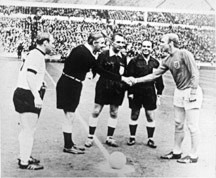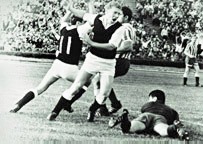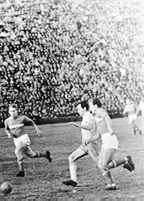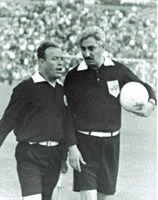|
Summer 1998 (6.2)
Great Moments in Soccer by Agshin Kazimzade
Between June 10 and July 12, soccer fans from around the world will gather in France to cheer on their favorite teams at the 1998 World Cup. Those who can't make the trip will tune in via television, radio, or the Internet to see if the Brazilian team can repeat their 1994 victory. People from all over the world will catch World Cup "fever," and Azeris are no exception. In fact, someday they hope to watch their homeland's team play in the finals. That's not to say that Azeri soccer fans haven't already had their share of exciting moments. Most surprising was Azerbaijan's defeat of Switzerland in 1996 during the qualifying rounds for the world championship. The final score was Azerbaijan-1, Switzerland-0. Thanks to a goal scored by #8, Vidadi Rezayev, the underdog Azeri team surpassed everyone's expectations. On their home turf in front of a crowd of 15,000, they knocked the Swiss out of the list of finalists for the World Cup. (Azerbaijan didn't make the list either.) In a 1997 rematch in Zurich, the Swiss team beat Azerbaijan 7-1, but still did not advance. But for once, Azeri soccer was a hot topic in the world sports media. Soccer was introduced to Azerbaijan in 1911 by the British employees of foreign oil companies. They used to play in the dusty vacant lots of Baku; their makeshift goals were fishing nets stretched between trees. Local Azeri boys were curious about this new game and soon learned to play. Today, it's common to see kids in Azerbaijan kicking a soccer ball around, trying to practice their skills. Perhaps one of them will become the next Alakbar Mammadov.
One highlight of his career was in 1955 during a tour through Italy. Mammadov scored an unbelievable four goals in a row against the Italian super club "Milan." Soon he became known as one of the five most outstanding center forwards in the world. While playing for the USSR team, Mammadov was named the Champion Soccer Player of Europe in 1960. He went on to play in the Olympic Games that year. Today, Alakbar Mammadov heads the Sports Department at the State Oil Academy of Azerbaijan, where he works to promote national soccer. He also leads and plays on a team of Azeri soccer veterans which takes part in demonstration matches in countries such as Iran, Germany, Turkey and Poland. Anatoliy Banishevskiy Banishevskiy was only 16 when he joined the "Neftchi" Baku soccer team. ("Neftchi" played in the championship prime-league of the former Soviet USSR.) Banishevskiy started playing for the Soviet national team when he was 17, and eventually became one of the most outstanding soccer stars of the 20th century. King of Soccer, Brazilian Pele himself called Banishevskiy "a super class player." Along with the national team of the Soviet Union, Banishevskiy took fourth place at the world championship in England. He was the major goal scorer of the USSR national team, scoring 19 goals.
In very special cases, the FIFA awards "The Golden Whistle" to outstanding umpires. This award was publicly presented to Tofig Bahramov by Her Majesty the Queen of England and by Stanley Rose, who was the president of the FIFA at that time. Bahramov was elected as a judge for the next World Cup tournament, held in Mexico in 1970, making him the first FIFA umpire to judge two World Cup championships. When former British Prime Minister Margaret Thatcher visited Baku several years ago, she specifically asked to meet Tofig Bahramov. She said that she and her countrymen had remembered his act of courage and fairness, and her visit would not have been complete without meeting him. During the last years of his life, Tofig Bahramov held the position of General Secretary of the AFFA (Azerbaijan Football Federation Association). With the help of his influence in Azerbaijan and in international soccer circles, he promoted its establishment and self-determination. When he died, Bahramov was buried in the Cemetery of Honorary Burial, a rare honor for sportsmen in Azerbaijan. Mostly musicians, writers, academicians and statesmen are buried there. AFFA Since 1992, AFFA had organized an independent championship of the Azerbaijan Republic in three leagues. The organization regularly participates in Eurocups, as well as European and world championships. Beginning with this season, AFFA will participate in the Intertoto Cup competition. A World Cup victory may still
be far away for Azerbaijan, but that doesn't make soccer any
less important there. After all, how can a country that has only
had organized soccer for seven years expect to compete with the
giants? For now, it's enough to be noticed by the international
sports community as a country with a lot of potential. And there
will always be legendary figures like Mammadov, Bahramov and
Banishevskiy to remember. In the words of Joao Avelang, current
president of the FIFA, "Azeri soccer has old traditions
and healthy ambitions." |




